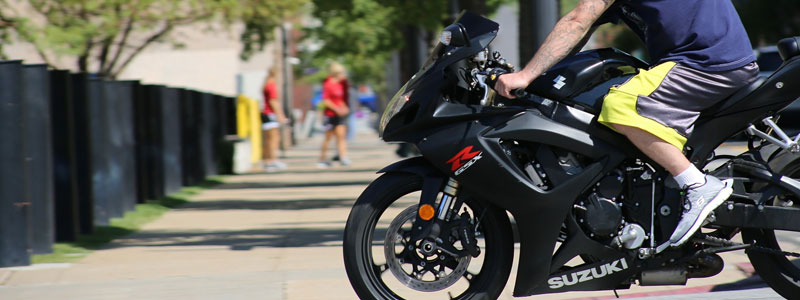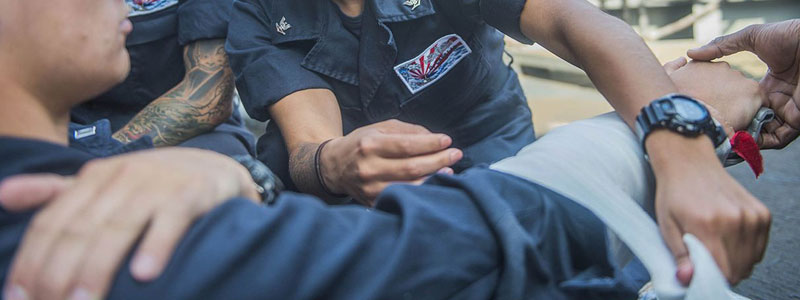5 Common Indiana Motorcycle Accident Injuries
Because motorcyclists are so exposed, their injuries in accidents tend to be more severe. However, there are a range of common injuries riders typically suffer after a motorcycle accident. Regardless if your injury is mild or severe, temporary or permanent, an inconvenience or a tragedy, you could be entitled to compensation if you’ve suffered any […]

January 10, 2018

Because motorcyclists are so exposed, their injuries in accidents tend to be more severe. However, there are a range of common injuries riders typically suffer after a motorcycle accident. Regardless if your injury is mild or severe, temporary or permanent, an inconvenience or a tragedy, you could be entitled to compensation if you’ve suffered any of these common injuries after an Indiana motorcycle accident.
1. Road Rash

One injury often associated with motorcycle accidents in particular is road rash. Road rash occurs when a motorcyclist slides across the pavement during a crash and suffers from abrasions to the skin.
There are two things in particular that can help prevent or decrease the severity of road rash. One is by investing in gear specifically made for motorcyclists. It’s estimated that riders lose an extra millimeter of flesh during a crash for every mile per hour they were traveling over 30 miles per hour. By wearing gear that’s made to withstand motorcycle accidents, you can literally save your skin. Put safety before fashion and make sure your gear is actually built to protect you.
The second thing you can do to decrease the severity of road rash is to slow down. As mentioned above, the faster you go, the more skin you stand to lose if you get into a motorcycle accident. Follow speed limits and slow down when approaching curves or intersections.
2. Emotional Trauma

Although we often think of physical injuries when we think of motorcycle accidents, motorcyclists can suffer from mental and emotional injuries as well. Motorcycle accidents can result in more severe injuries than car accidents that take a toll on a person’s mental wellbeing. It can be difficult to adjust to new limitations imposed by severe injuries, whether temporary or permanent.
However, even if you emerge from your accident physically unscathed, you can still suffer from emotional trauma. Some riders suffer from post-traumatic stress disorder (PTSD) after a motorcycle accident. A motorcycle accident can make mental health conditions riders have previously struggled with resurface or can make current conditions even worse.
3. Broken Wrist

What do you do when you feel yourself starting to fall? If you’re like most people, you probably throw your hands out to catch yourself. That instinct may be useful if you trip on the sidewalk, but if you’re falling off of a motorcycle traveling at high speeds, it’s actually more harmful than it is helpful. Many motorcyclists have suffered broken or fractured wrists simply because they instinctively threw their hands out during a motorcycle accident.
Proper gear is helpful in preventing wrist injuries during a motorcycle accident. Make sure the gloves you buy cover your wrists and have straps so they don’t fly off during a crash. Look for gloves with strong protection around the base of your palms. Make sure any gloves you buy aren’t so bulky that they actually inhibit your ability to ride.
4. Biker’s Arm

Like broken wrists, biker’s arm is an injury that’s the result of the body’s instinct to protect itself. When motorcyclists realize a crash is imminent, they often use their arms to try to protect themselves. That means that their arms absorb most of the impact of the crash.
But biker’s arm doesn’t refer to broken bones or bruises. Instead, it refers to the nerve damage the arms may suffer during a motorcycle accident. It can also occur if the rider’s arm gets stuck underneath the bike or under another heavy object during the accident.
Biker’s arm varies in terms of longevity and severity. For some, the nerve damage may be temporary loss of feeling. For others, biker’s arm can result in permanent paralysis.
5. Traumatic Brain Injury (TBI)

One of the most severe injuries a motorcyclist can suffer is a traumatic brain injury (TBI). Although TBIs exist on a spectrum of severity, from mild concussions to injuries resulting in death, riders who have suffered from a TBI should seek medical attention regardless of how mild they may believe their injury is. Only a doctor can properly ascertain the severity of a TBI and prescribe the correct treatment.
To protect against TBIs, it’s important to wear a helmet. Indiana doesn’t require motorcyclists over the age of 18 to wear helmets, but we strongly encourage riders to wear helmets regardless. Helmets are 37 percent effective at preventing motorcycle deaths, but they’re even better at preventing brain injuries: about 67 percent effective, according to the Insurance Institute for Highway Safety.
Help from an Indiana Motorcycle Accident Lawyer
Whether you’ve suffered from one of these common motorcycle accident injuries or a different injury entirely, it’s likely that your medical bills are beginning to pile up. You shouldn’t have to pay for someone else’s reckless driving. Call Hensley Legal Group today or contact us online for a free consultation.
Available 24/7
Free Case Review
You won’t pay any fees until we win your case.
It’s easy - you can: